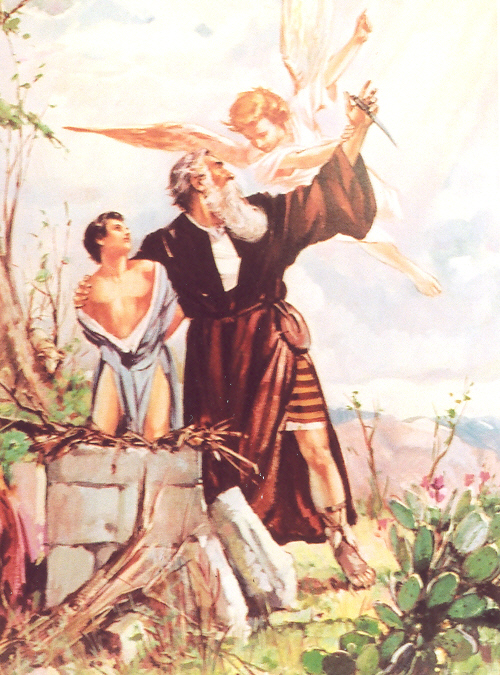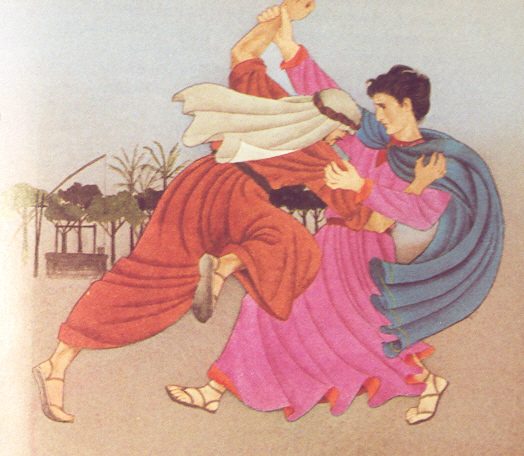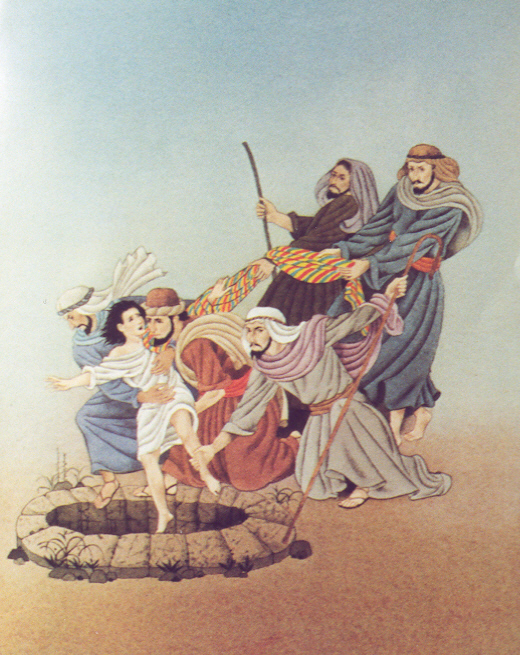
Return to
Index The Catholic Faith
Return to
Level Three Topic Index
Home Page
The beautiful story of how God prepared the world for the coming of Jesus Christ and of how Jesus accomplishes this plan for the redemption, or salvation, of the human race is called salvation history. Jesus was to restore what had been lost through original sin. God decided to form for himself a people, the chosen people, to whom he would reveal himself and his plan of salvation. From among this sacred community he would choose the woman who would be the mother of the Redeemer.
God Calls Abraham
God chose a man named Abram, who lived in the land of Mesopotamia almost four thousand years ago. He made a covenant (agreement or promise) with him, promising to make Abram the father of many descendants, who would become a great nation. God also told him that this nation would live in a wonderful place called the Promised Land: I will make you a great nation, and I will bless you; I will make your name great, so that you will be a blessing. I will bless those who bless you and curse those who curse you. All the communities of the earth shall find blessing in you (Gen 12:2-3).
Abram agreed to the covenant, and to show his new mission in life, God gave him the new name of Abraham, which means "father of many people". When he agreed to this covenant, Abraham showed great faith in God because he and his wife were very old and yet they believed that the Lord would give them many children. They trusted God so much that they were willing to leave family and home in order to set out for the Promised Land. The early Christians recognized the great faith that Abraham had in God; it is mentioned in the letter to the Hebrews: By faith Abraham obeyed when he was called and went forth to the place he was to receive as a heritage; he went forth, moreover, not knowing where he was going (Heb 11:8). Even today in the liturgy of the Catholic church we honor this holy man as, "Abraham, our father in faith" (Eucharistic Prayer I).
Isaac Continues the Covenant

After God's promise of descendants, Abraham had a son named Isaac. Needless to say, the boy was loved dearly by his elderly parents. One day God wanted to test Abraham's faith. He commanded this father to sacrifice his beloved only son as an act of worship: "Take you son, Isaac, your only one, whom you love, and go to the land of Moriah. There you shall offer him up as a holocaust" (Gen 22:2).
Knowing that man must love and serve God more than his family, Abraham took Isaac up a mountain and prepared to sacrifice him as God had commanded. Just as the knife was about to plunge into Isaac an angel stopped Abraham and revealed to him that it was a test. Now God knew that Abraham truly loved him more than anyone else, and he rewarded this love by promising to continue his covenant through Isaac. After his father's death Isaac became the second patriarch, or leader, of God's chosen people.
The sacrifice of his only son that Abraham was willing to make was a prefigurement of God's love for mankind. A prefigurement is some person or event that happens before another event to which it is similar in some way. In this case, the prefigurement was of the sacrifice that God the Father was to make of allowing Jesus, his only Son, to be sacrificed on the Cross for our sins.
The Covenant Continues with Jacob
Isaac married a girl named Rebekah, and they had twin boys, Esau and Jacob. God chose Jacob as the one with whom he would keep the covenant he had made with Abraham, saying: "I, the Lord, and the God of your forefather Abraham and the God of Isaac; the land on which you are lying I will give to you and your descendants. . . In you and your descendants all the nations of the earth shall find blessing. Know that I am with you: I will protect you wherever you go . . . "(Gen28:13-15).

Soon after this event God gave Jacob a new name, Israel, which means "the man who strives with God." This new name is very important because God's people used it as the name for their community: the Israelites. Jacob had twelve sons who became the fathers of the twelve tribes of families, that made up the chosen people. Thus Jacob became the third patriarch of God's people.
The Story of Joseph

Among the many sons of Jacob, there was one who was especially dear to him - Joseph. The other sons were envious at this, and they grew angry with their brother. They began to plan among themselves how they could get rid of Joseph once and for all. One day, when there out in the fields watching their sheep, they sold poor Joseph to a band of wandering slave traders who were on their way to Egypt. Then they told Jacob that Joseph had been killed by a wild beast. Jacob was heartbroken. If only he knew that they had sold their brother for some pieces of silver!
In this, Joseph reminds us of Jesus who was sold by one of his friends for thirty pieces of silver. Joseph also prefigures Jesus because he was to become a kind of savior in Egypt for his brothers. This is how it happened.
When he arrived in Egypt, Joseph was bought by an important ruling family because he was handsome and very intelligent. Soon he became a trusted servant of the Pharaoh (The Egyptian king) and was given important positions in the royal court - he even became second in command in all of Egypt. In the meantime, the land of the chosen people was in a time of famine so the sons of Jacob traveled to Egypt in search of food. Imagine their surprise to find Joseph in command! Instead of having them killed or thrown into prison because of what they had done to him, Joseph embraced each one and gave them all the food they needed. He invited his family to move to Egypt, which they did. Joseph gave them all nice homes and loved them with all of his heart.
In this Joseph again prefigures Jesus. Joseph forgave those who had wronged him and gave them everything they needed for a happy life. This reminds us of Christ, who forgives all of our sins and gives us every grace and blessing we need to live good Christian lives while we journey to heaven, our true home
For four hundred years the Israelites lived in the land of Egypt. While Joseph was alive they were treated with honor and respect. The Israelites stayed in Egypt for many years and the rulers were no longer happy to have them. One particular Pharaoh made the Israelites the slaves of the Egyptian people. The descendants of Jacob were forced to do heavy manual labor from sunrise to sunset; they were used as "beasts of burden" to build many of the pyramids in Egypt. God's people soon began to think that the Lord had abandoned them, they wondered if he had taken back the wonderful covenant of blessing that he had made with Abraham, Isaac, and Jacob. It was at this difficult point in their history that God sent a very special man to his people.
Used with the permission of The Ignatius Press 800-799-5534
Return to
Index The Catholic Faith
Return to
Level Three Topic Index
Top
Home Page